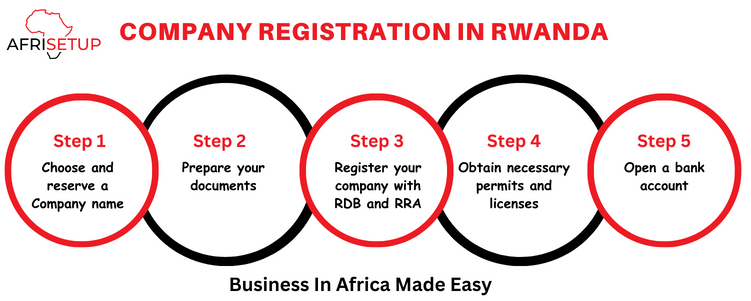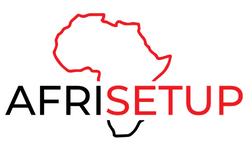

Rwanda has a growing economy and a favorable business environment. As a member of the East African Community and the African Continental Free Trade Area (AfCFTA), it provides access to a larger market and opportunities for regional integration and trade. The government has implemented policies and reforms that have made doing business in Rwanda easier, attracting local and foreign investors.
Wondering how to register a company in Rwanda, the types of companies that can be registered, and the benefits? In this video, we answer all these questions and more, providing expert insights on company registration in Rwanda. Hit play and get all the details!
Online Company Registration in Rwanda
Thanks to a seamless online system, registering a company in Rwanda is now more straightforward than ever. Whether you’re a local entrepreneur or a foreign investor, the Rwandan government provides a digital platform through the Rwanda Development Board company registration system that simplifies business registration. Follow these steps:
Step 1: Choose and Reserve a Business Name
Select a unique name for your company that has not been used in Rwanda. You can check and reserve a business name through the Rwanda Development Board (RDB) website. When making a selection, keep in mind that the Office of the Registrar General in Rwanda will not reserve or authorize a company name if it:
• Violates any Rwandan laws
• Misleads or deceives the public
• Is regarded as insulting or against ethical conduct.
• Is similar to or confusingly comparable to an already registered name
Step 2: Prepare Your Documents
When starting a company, preparing the documents according to the specific requirements to register a company in Rwanda is essential. Here is a checklist to guide you:
– Physical office address in Rwanda: This will be the official registered address.
– Identification documents:
– Copies of national ID or passport for all shareholders, directors, and beneficial owners
– National ID number (for Rwandan nationals)
– Board and shareholder details:
– Full names, nationalities, and identification details
– Occupation of all shareholders/directors of the proposed company
– Residential addresses (particularly for directors)
– Share allocation percentages
– Memorandum and Articles of Association:
– Two signed copies of the Memorandum of Association
– Articles of Association outlining the internal rules of the business
– Passport-sized photos: Required for all shareholders, directors, and beneficial owners.
– Contact information: Valid email addresses and phone numbers for shareholders, directors, and authorized representatives.
Here are the requirements for registering a foreign company in Rwanda:
• Power of attorney to represent the company in Rwanda. (Notarized)
• A duly authenticated copy of the memorandum and Articles of Association. (Notarized)
• Certificate of Registration/Incorporation issued by the registration authority in the country of incorporation. (Notarized)
• Notarized resolution from the authorized agency authorizing the opening of a branch.
• Passport copies and address of the shareholders, directors, and beneficial owners
• List of directors residing in Rwanda (at least one)
• Registered physical office address in Rwanda
• Contact details (email and phone number) of the local representative and the foreign parent company
• Tax Identification Number (TIN) application for the branch
• Notarized and translated documents (if not in English or French)
Step 3: Obtain a Certificate of Incorporation
The Rwanda Development Board (RDB) will consider your application after you submit all of the documentation indicated in Step 2 and pay the required fees.
Once the Registrar General confirms that all legal requirements have been met, the office will issue a Certificate of Incorporation within six (6) hours. This certificate proves that your company is officially registered and legally recognized. After acquiring it, your company is entirely founded and can begin activities immediately.
Step 4: Register Your Company with the Rwanda Revenue Authority
After opening a company in Rwanda, you must register for taxes with the Rwanda Revenue Authority (RRA) to facilitate tax payments and business transactions.
Step 5: Obtain Necessary Permits and Licenses
After completing all the necessary processes for company registration in Rwanda, depending on the nature of your business, you may need to seek extra permits and licenses from the relevant authorities.
Step 6: Open a Bank Account
To perform business activities, you must open a bank account for your company. Currently, there are 16 commercial banks from which to choose.
Post-registration Requirements for Rwanda Company Registration
After successfully registering a company in Rwanda, there are key compliance steps to follow to ensure smooth operations:
• Tax Compliance: Rwanda’s tax system is well-structured, with mandatory Value Added Tax (VAT) registration for eligible businesses. Ensure timely filing of tax returns to avoid penalties.
• Business Licensing: Licenses must be renewed periodically. Continually monitor expiration dates to maintain compliance.
• Employment Obligations: Employers must register employees with the Rwanda Social Security Board (RSSB) and adhere to labor laws to ensure workplace harmony.
• Employment Compliance: Follow Rwanda’s labor laws regarding contracts, working hours, leave, and employee rights.
• Annual Returns: File annual returns with the Rwanda Development Board (RDB), which include updated financial statements and company information.
• Annual General Meeting (AGM): If your business is a public company, hold an AGM as the law requires.
Note for Foreign Companies: Most post-registration steps are the same as for local companies, but some documents, such as a notarized Power of Attorney, certified translations, and a local director, are required during registration. Branches may also be required to submit annual summaries of their parent company’s activities.
Contact us today for expert advice on company Registration in Rwanda
Types of Companies in Rwanda
Companies in Rwanda are generally defined into two categories: private and public, each having a distinctive set of legal and practical differences. According to Rwandan company law, every company is initially considered public unless it states in its incorporation documents that it is private. Understanding these classifications is an important component of satisfying the requirements for Rwanda company registration.
1. Public Companies
Public companies are those that have offered shares to the general public, usually through an Initial Public Offering (IPO), and are listed on one or more stock exchanges. These companies are distinct from state-owned enterprises and are subject to the same rules as publicly traded entities.
Key features include:
• They can raise funds from the public by selling shares or debentures.
• There is no restriction on the number of stockholders.
• Shares are generally transferable without limitation.
Public Limited Companies (PLCs) can list their shares on the stock market and raise funds from various investors.
2. Private Companies
Private companies operate under stricter conditions than public companies. Due to their simplified compliance needs, private companies are frequently chosen by small- to medium-sized businesses and startups. A corporation with only one shareholder is automatically referred to as private.
Key features include:
• A maximum of 100 shareholders.
• Share transferability restrictions imply that shares cannot be freely sold or transferred without prior approval.
• No public invitation to subscribe to shares or debentures.
Private companies are further divided into:
I. Company Limited by Shares
This is a type of company in which the liability of its members is limited to the number of shares they hold. If the company is wound up, the members will only be liable for the unpaid amount of their shares.
II. Company Limited by Guarantee
This is a type of company in which the liability of its members is limited to the amount they have guaranteed to contribute to the company in the event of its winding up. Non-profit organizations commonly use this type of company.
III. Company Limited by Shares and by Guarantee
This type of company combines the features of a company limited by shares and a company limited by guarantee. Its members hold shares, and their liability is limited to the amount of shares they hold. It also has members who have guaranteed to contribute a certain amount if the company is wound up.
IV. Unlimited Company
This is a type of company where the liability of its members is unlimited. If the company is wound up, the members will be liable for all the company’s debts and liabilities.
V. Protected Cell Company
This type of company can segregate its assets and liabilities into separate cells, each treated as a separate legal entity. This is commonly used in the insurance industry, where each cell can underwrite a different type of risk.
Recommended Company Type Based on Business Purpose
| Business Type | Recommended Company Type | Notes |
| Small or Medium Enterprise (SME) | Company Limited by Shares | Flexible and most common; offers limited liability for owners. |
| Non-Profit or NGO | Company Limited by Guarantee | No shareholders; ideal structure for non-profit operations. |
| Financial or Insurance Firm | Protected Cell Company (PCC) | Allows separation of assets and liabilities across distinct business cells. |
| Specialized Legal or Financial Entity | Unlimited Company | Suitable for high-risk ventures; members have unlimited liability. |
| Mixed Structure (Rare) | Company Limited by Shares and Guarantee | Combines both models; some liability is limited by the capital invested and some by the guarantee. |
Company Registration in Rwanda Fees
The Rwanda company registration costs are minimal, with additional expenses depending on the licenses required. Always budget for unforeseen costs. Contact us to get the actual quotation.
5 Benefits of Registering a Company in Rwanda
Business registration in Rwanda is essential for entrepreneurs looking to establish a legally recognized and credible business. The country offers numerous advantages for startups and investors, making it an attractive destination for business growth. Some key benefits include:
1. Ease of Doing Business: Rwanda consistently ranks among the top African countries for ease of doing business. The government has streamlined registration processes, embraced digital platforms, and minimized bureaucratic hurdles, making it easier and faster to start a business.
2. Access to Growing Markets: Located in the heart of East Africa, Rwanda provides easy access to a market of over 140 million people through regional trade agreements like the East African Community (EAC). This strategic position makes it a hub for business operations in the region.
3. Supportive Government Policies: The Rwandan government promotes entrepreneurship by offering tax incentives, such as exemptions for start-ups in specific sectors. Digitalizing services, including company registration and tax filings, further reduce operational challenges.
4. Infrastructure Development: Rwanda has significantly improved its infrastructure to support business operations and reduce transport costs, enhancing trade efficiency. These developments make registering a company in Rwanda easier and more cost-effective.
5. Lower Levels of Risk: Rwanda is one of Africa’s safest countries, with low crime and corruption rates. This stable environment minimizes business risks and encourages investor confidence.
Tips to Make Company Registration in Rwanda an Easy Process
• Prepare all documentation in advance to avoid delays.
• Familiarize yourself with the RDB portal for online applications.
• Consult industry-specific experts for tailored advice.
Frequently Asked Question (FAQs)
Foreigners need a power of attorney, notarized parent company documents, passport copies of shareholders/directors, and a list of directors in Rwanda.
Steps:
- Visit the RDB website.
- Select “Enterprise Search.”
- Enter a search term.
- Review the results, including name, number, date, and address.
This process helps ensure that a business has completed proper company registration in Rwanda and is legally recognized to operate.
Rwanda is a good place to do business, with stable politics, vigorous growth, and a pro-business environment. It ranks 2nd in Africa for ease of doing business.
Rwanda has abolished the statutory costs for most types of businesses, making it affordable for entrepreneurs to start a company.
To dissolve a company in Rwanda, obtain a removal certificate from the Registrar General at the Rwanda Development Board (RDB). This applies if the company is solvent and has no pending creditor claims.
Yes, foreigners can do business in Rwanda without restrictions and are granted the same rights as local investors.
The registration process typically takes 5 to 7 days, depending on the complexity of your business structure and the completeness of your documentation
Rwanda allows wholly foreign-owned companies, though some sectors may have restrictions or require special permits.
Conclusion
Registering a company in Rwanda is straightforward, thanks to the efficient online registration system and supportive business environment. As trusted experts, we help you navigate each step and ensure you choose the ideal legal structure for your business’s success.
Do you need assistance with company registration in Rwanda? Feel free to contact us to get started.
